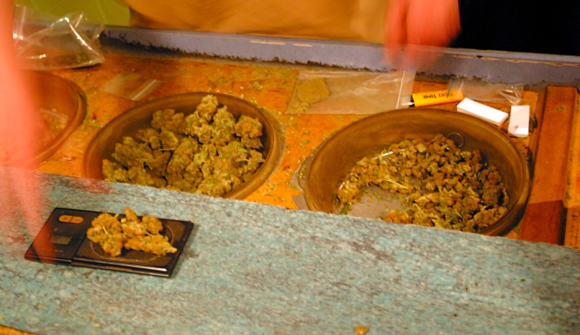
The country's rapidly growing marijuana industry has a tax problem. Even as more states embrace legal marijuana, shops say they are being forced to pay crippling federal income taxes because of a decades-old law aimed at preventing drug dealers from claiming their smuggling costs and couriers as business expenses on their tax returns.
Congress passed that law in 1982 after a cocaine and methamphetamine dealer in Minneapolis who had been jailed on drug charges went to tax court to argue that the money he spent on travel, phone calls, packaging and even a small scale should be considered tax write-offs. The provision, still enforced by the I.R.S., bans all tax credits and deductions from "the illegal trafficking in drugs."
Marijuana business owners say it prevents them from deducting their rent, employee salaries or utility bills, forcing them to pay taxes on a far larger amount of income than non-marijuana businesses with the same earnings and costs. They also say the taxes, which apply to medical and recreational sellers alike, are stunting their hiring, or even threatening to drive them out of business. – New York Times, May 9, 2015
If anyone needs another reason to hate the federal income tax and the agency that enforces it, this is a good one. The IRS bans marijuana sellers from deducting most business expenses, even though they are operating in full compliance with all state and local laws.
The federal Justice Department is also operating under guidance not to prosecute these businesses, though they are nominally illegal. This is not enough for the IRS, which apparently feels it must enforce the letter of the law even when the law is pointless.
An obscure tax code provision called "280E" says "illegal" drug traffickers can't deduct their business expenses, such as rent and employee salaries. Yet, as if to show how irrational the law is, they can deduct their "cost of goods sold." That means the marijuana.
Legal marijuana growers in Colorado, for instance, can deduct the cost of seeds and baby plants, fertilizer, growing lights and others directly related to producing the marijuana. When they go to sell the marijuana, however, nothing is deductible.
The difference in taxes due is enormous. Instead of paying, say, 30% on net profits, shops have to pay 30% of almost their entire gross revenue. Many are just now finding this out as they file their 2014 tax returns.
Another law bans marijuana businesses from the banking system, so they have to operate on cash for everything. The NYT story notes one Colorado business on which the IRS imposed a $30,000 penalty because he paid his payroll taxes in cash. The owner challenged the penalty and won. Others may not have been so lucky.
Tax policy always distorts behavior as people try to game the system. This one is no exception. Most stores sell more than just marijuana. What about the rent and labor devoted to selling t-shirts and posters? Are those expenses deductible?
No one knows and the IRS won't say. The result is massive wasted effort as business owners and their accountants figure out how to operate the business in ways that would be wasteful if not for the weird tax regime they must obey.
Crazy rules like this serve mainly to make lawbreakers of people who sincerely want to follow the rules, while others ignore the rules because they rightly see compliance as futile.
Worst of all, the extra taxes inevitably feed through to retail prices. Maybe we need not shed a tear for the Baby Boomers looking for a Rocky Mountain High after the ski slopes, but what about cancer patients and others in real pain. Marijuana is the only pain relief available to many – and their own government is making it more costly.
In time, as more states legalize marijuana, Washington may see the grave injustice it is doing to both businesses and their customers. How many years will it be?
